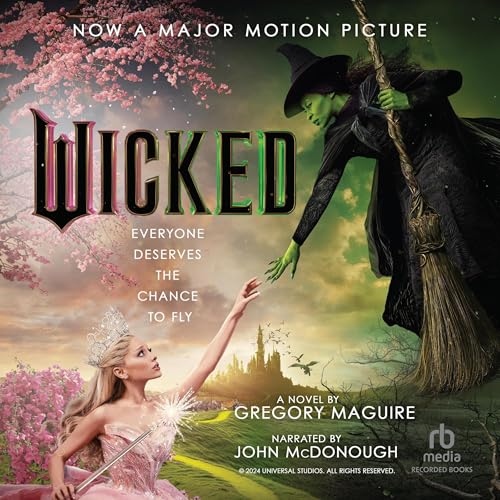Gregory Maguire – Wicked Audiobook
Gregory Maguire – Wicked Audiobook

text
Gregory Maguire’s “Wicked: The Life and Times of the Wicked Witch of the West” is a groundbreaking reimagining of L. Frank Baum’s classic “The Wizard of Oz.” Since its publication, Maguire’s novel has captivated readers with its intricate storytelling, complex characters, and profound exploration of morality, power, and identity. This article delves into the essence of “Wicked,” examining its narrative depth, thematic richness, and lasting impact on both literature and popular culture.
About the Author: Gregory Maguire
Gregory Maguire is an acclaimed American novelist known for his inventive retellings of well-loved fairy tales. Born in 1954, Maguire has a background in theater and journalism, which profoundly influences his narrative style and character development. Prior to “Wicked,” Maguire authored several other works, including “Confessions of an Ugly Stepsister” and “Son of a Witch,” which similarly offer fresh perspectives on familiar stories. His ability to intertwine political intrigue, social commentary, and rich character studies has earned him a dedicated readership and critical acclaim.
Synopsis of “Wicked: The Life and Times of the Wicked Witch of the West”
“Wicked” presents a nuanced backstory of Elphaba, the titular Wicked Witch of the West from Baum’s Oz series. Contrary to her portrayal as a one-dimensional antagonist, Maguire paints Elphaba as a complex, misunderstood protagonist grappling with societal expectations and personal aspirations.
The novel is narrated from the perspective of Nessarose, Elphaba’s disabled sister, and explores the intricate dynamics of their family, friendships, and political alliances. As Elphaba grows into a formidable sorceress, her defiance against the corrupt Wizard of Oz and his oppressive regime positions her as a revolutionary figure. The story delves into themes of power, prejudice, and the fine line between good and evil, challenging readers to reconsider the motivations and circumstances that lead to Elphaba’s vilification.
Themes and Analysis
**1. Morality and Ambiguity
Maguire masterfully blurs the lines between right and wrong, presenting characters with multifaceted motivations. Elphaba’s actions, often deemed wicked, are portrayed as driven by a desire for justice and equality, prompting readers to question the true nature of villainy.
**2. Power and Corruption
The novel examines how power can corrupt and the complexities of political maneuvering. The Wizard’s manipulation of information and control over the populace highlight the dangers of authoritarianism and the struggle for ethical leadership.
**3. Identity and Self-Discovery
Elphaba’s journey is one of self-discovery and acceptance. Her battle with societal norms and personal demons underscores the importance of embracing one’s true self, even in the face of adversity and misunderstanding.
**4. Friendship and Loyalty
The intricate relationships between characters, especially between Elphaba and Nessarose, explore themes of loyalty, sacrifice, and the bonds that tie individuals together despite differing paths and beliefs.
Critical Reception
Upon its release, “Wicked” received widespread acclaim for its inventive storytelling and depth of character development. Critics lauded Maguire’s ability to transform a familiar narrative into a thought-provoking and emotionally resonant tale. The novel’s success led to its adaptation into a highly successful Broadway musical, further cementing its place in contemporary literature and entertainment.
Praise Highlights:
Complex Characters: Critics appreciated the layered portrayal of Elphaba and supporting characters, noting the departure from traditional good-versus-evil narratives.
Thematic Depth: The exploration of political and social themes was commended for adding richness and relevance to the fantasy setting.
Literary Craftsmanship: Maguire’s prose and world-building skills were frequently highlighted as standout elements contributing to the novel’s immersive quality.
Adaptations and Cultural Impact
The success of “Wicked” transcended the literary world, inspiring a blockbuster Broadway musical that debuted in 2003. The musical adaptation, with music and lyrics by Stephen Schwartz and book by Winnie Holzman, expanded the story’s reach, combining spectacular performances with a compelling narrative that resonated with diverse audiences.
The musical’s enduring popularity has led to numerous international productions, a dedicated fan base, and significant cultural impact. It has sparked discussions on themes of redemption, the nature of evil, and the power of perspective, mirroring the novel’s original intentions.
Why “Wicked” Matters
“Wicked: The Life and Times of the Wicked Witch of the West” stands as a testament to the power of reinterpretation in literature. By providing a deeper, more empathetic look at a traditionally villainous character, Maguire invites readers to explore the complexities of human nature and societal constructs. The novel challenges preconceived notions and encourages a more nuanced understanding of morality and justice.
Conclusion
Gregory Maguire’s “Wicked” is more than a retelling of a beloved story; it is a profound exploration of character, theme, and narrative innovation. Its critical acclaim, coupled with its successful adaptation into a cultural phenomenon, underscores its significance in modern literature and entertainment. Whether you’re revisiting Oz through a fresh lens or encountering Elphaba’s story for the first time, “Wicked” offers a captivating and thought-provoking journey that continues to enchant and inspire.